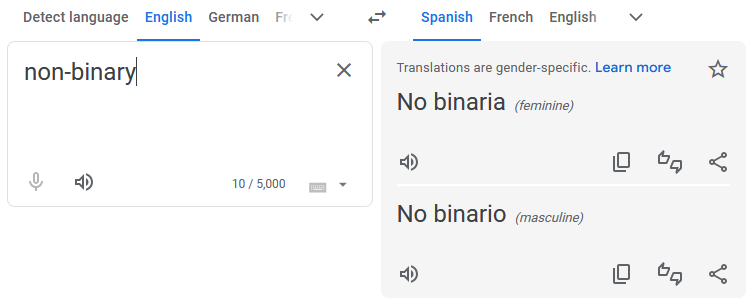this post was submitted on 29 Nov 2024
238 points (96.5% liked)
Linguistics Humor
1141 readers
19 users here now
Do you like languages and linguistics ? Here is for having fun about it
Share this community: [[email protected]](/c/[email protected])
Serious Linguistics community: [email protected]
Rules:
- 1- Stay on Topic
Not about Linguistics, language, ways of communications - 2- No Racism/Violence
- 3- No Public Shaming
Shaming someone that could be identifiable/recognizable - 4- Avoid spam and duplicates
founded 2 years ago
MODERATORS
you are viewing a single comment's thread
view the rest of the comments
view the rest of the comments

Actually the problem is not that hard to solve unless you are trying to be deliberately obnoxious:
You say "no binario\a" depending to the noun it defines. It's correct to say no binaria because it refers to a person (in spanish persona, female noun).
But it's also ok to say no binario if you refer to a human being (ser humano in spanish, this one male noun).
why do this instead of "no binarie"? according to others this is what actual spanish non-binary people do
Because not all the words that are gendered refer to a single gender. I understand when we change the last vowel to an e to add a non gendered version of a word that has both male and female forms (e.g. nosotros/as, spanish for "we", would do great with a nosotres). But when the word itself is already non gendered (as persona, which although is considered female, refers to any person of any kind, because there is no male alternative) I don't see a reason to do it.
There is no discrimination in referring to someone as a persona, since there is no "persono" word, so saying persona no binaria will offend only who wants to be offended.
It should be the same in portuguese, or?